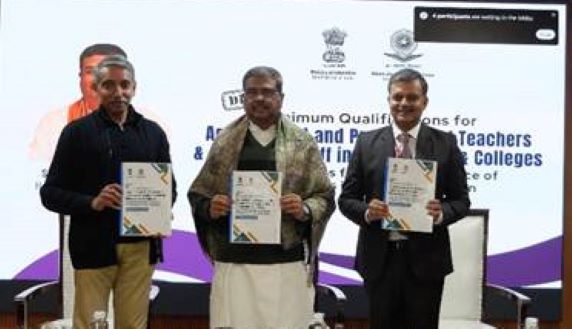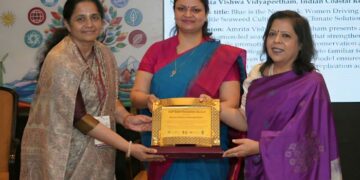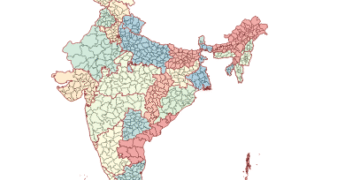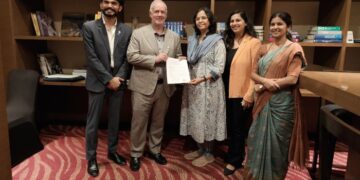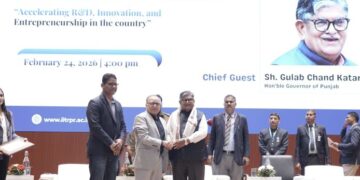UGC has revised the UGC Regulations on Minimum Qualifications for Appointment of Teachers and Other Academic Staff in Universities and Colleges and Measures for the Maintenance of Standards in Higher Education, 2018 and developed a draft UGC (Minimum Qualifications for Appointment and Promotion of Teachers and Academic Staff in Universities and Colleges and measures for the Maintenance of Standards in Higher Education) Regulations 2025.
The proposed UGC Regulations, 2025 are intended to give flexibility to universities in appointing & promoting teachers and academic staff in their institutions and cover appointment of vice-chancellors, directors (all grades), principals of colleges, professors, associate professors, assistant professors, librarians (all grades), etc. While the final regulations will be notified after taking into consideration inputs from public consultation, feedback and comments (open till Feb 5), the draft has already kicked a political storm over power of chancellors/visitor, the governor of the state in appointing VCs.
The draft regulations were launched by the Minister of Education, Dharmendra Pradhan on January 6, 2025 while inauguraring the new auditorium named ‘Pushpagiri’ of the UGC in New Delhi. The minister said that these draft reforms and guidelines will infuse innovation, inclusivity, flexibility and dynamism in every aspect of higher education, empower teachers and academic staff, strengthen academic standards and pave the way for achieving educational excellence. He congratulated the team of UGC for their efforts in formulating the Draft Regulations and Guidelines in sync with the ethos of NEP 2020.
The direct recruitment to the posts of Assistant Professor, Associate Professor and Professor in the HEIs shall be based on merit through an all-India advertisement, followed by selection by a duly constituted Selection Committee as per the provisions made under these regulations.
Notable contributions to be considered by the selection committee for recruitment and promotion of university & college teachers are: (1) 4 Innovative Teaching Contribution; (2) Research or Teaching Lab Development; (3) Consultancy / Sponsored Research funding as a Principal Investigator or Co-Principal Investigator; (4) Teaching contributions in Indian languages; (5) Teaching-Learning and Research in Indian Knowledge System; (6) Student Internship / Project Supervision; (7) Digital Content Creation for MOOCs; (8) Community Engagement and Service; (9) Startup, as per the intellectual property policies of the HEI, registered with the Registrar of Companies (ROC) as a founding promoter, successfully raising funding
About appointments on Contract Basis, the draft says that the teachers may be appointed against the vacant sanctioned faculty positions on a contract basis for a maximum period of six months, only when it is essential. The qualifications and selection procedure for appointing them should be the same as those applicable to a regularly appointed teacher. The fixed total emoluments paid to such contract teachers should not be less than the monthly gross salary of a regularly appointed Assistant Professor.
The appointment of a vice-chancellor under these draft regulations have also been detailed. He ro she must be a distinguished person possessing high academic qualifications and demonstrated administrative and leadership capabilities, strong alignment to constitutional values, strong social commitment, belief in teamwork, pluralism, ability to work with diverse people, with a flair for innovation and a global outlook in higher education, along with the overall vision of the institution and abilities to manage complex situations with a minimum of ten years of experience as (i) a Professor in an HEI or (ii) at a senior level in reputed research or academic administrative organizations or (iii) at a senior level in industry, public administration, public policy and/or public sector undertakings, with a proven track record of significant academic or scholarly contributions, shall be eligible to be appointed as Vice-Chancellor.
The Chancellor/Visitor shall constitute the Search cum Selection Committee comprising three experts. The Search-cum-Selection Committee shall short-list the candidates and interact with the short-listed candidates to prepare a panel of 3-5 names for submission to the Visitor/Chancellor. The Visitor/Chancellor of the university shall appoint the Vice Chancellor out of the panel of names recommended by the Search-cum-Selection Committee. The Vice-Chancellor shall hold office for a term of five years from the date on which he or she enters upon his or her office or until he or she attains the age of seventy years, whichever is earlier, and shall be eligible for re-appointment for one more term by following the procedure.
The draft regulations and guidelines are available for public consultation, inviting comments, suggestions and feedback from stakeholders on or before February 5, 2025 at the following email: draft-regulations@ugc.gov.in
Read the draft regulations here
Key Highlights of the Regulations
- Flexibility: Candidates can pursue teaching careers in subjects they qualify for with NET/SET, even if different from their previous degrees. Ph.D. specialisation will be prioritised.
- Promoting Indian Languages: The draft Regulations encourage the use of Indian languages in academic publications and degree programmes.
- Holistic Evaluation: It aims to eliminate score-based short-listing, focusing on a broader range of qualifications, including “Notable Contributions.”
- Diverse Talent Pool: Creates dedicated recruitment pathways for experts in arts, sports, and traditional disciplines.
- Inclusivity: Provides opportunities for accomplished sportspersons, including those with disabilities, to enter the teaching profession.
- Enhanced Governance: Revises the selection process for Vice-Chancellors with expanded eligibility criteria with transparency.
- Simplified Promotion Process: Streamlines the criteria for promotions, emphasising teaching, research output, and academic contributions.
- Focus on Professional Development: Encourages continuous learning and skill enhancement for teachers through faculty development programs.
- Enhanced Transparency and Accountability: Promotes transparent processes for recruitment, promotion, and addressing grievances.


